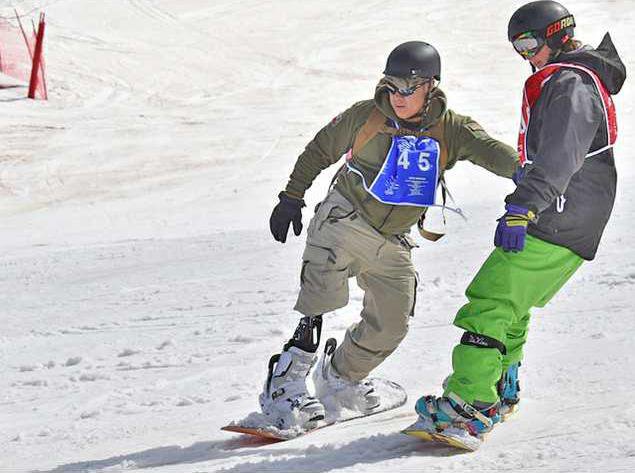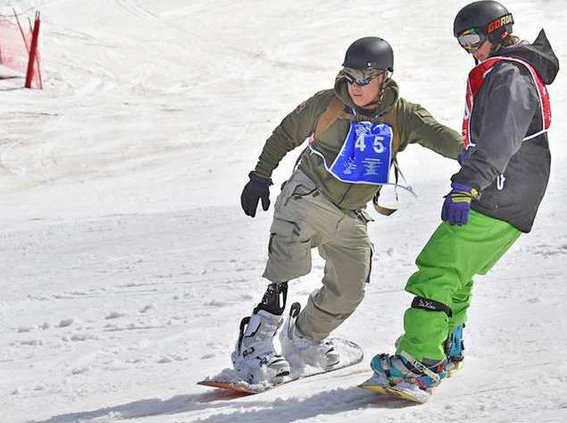More than 400 veterans with traumatic brain injuries, spinal-cord injuries, amputations and other injuries participated in the 28th annual National Disabled Veterans Sports Clinic on March 29-April 4 in Snowmass, Colo. Former 3rd Infantry Division soldier Sgt. Kristian Cedeno was among the disabled vets learning downhill and cross-country skiing, snowboarding and other sports, including scuba diving, rock climbing and wheelchair self-defense.
“I chose snowboarding,” said Cedeno. “I’d done it for 15 years while growing up in Queens, N.Y., but I had to start all over again. I had to re-learn how to do it wearing a special artificial leg called a moto knee. It’s designed especially for snowboard and cross-country skiing.”
Cedeno is an infantryman who lost his right leg in 2012 when an improvised explosive device exploded near him. At the time, he was serving with the 3rd ID’s 2nd Armored Brigade Combat Team in Afghanistan. In addition to losing his leg, he also suffered several shattered and dislocated bones and vast muscle and artery damage. Cedeno previously had served in Iraq, also with the 3rd ID.
Although he had difficulty walking with the moto knee, he said that after the second day, he was doing pretty well snowboarding with it. He said he was able to ski without his coach and made it down the mountain by himself. This was Cedeno’s second time participating in the winter-sports clinic.
Sarah Sechrist, senior public relations manager for Crosby Marketing, said the winter sports clinic promotes rehabilitation through adaptive Alpine and Nordic skiing as well as other activities. It’s supported by the Disabled American Veterans and the U.S. Department of Veterans Affairs, she said.
She said participants are retrofitted with adaptive equipment, like the moto knee, that enables them to enjoy winter and other challenging sports. About 200 specially trained, certified instructors and rehabilitation specialist help the participants, she said. The annual event has been a starting point for some disabled athletes to begin competing in Paralympics, Sechrist added.
“(The clinic) helps build self-confidence,” Cedeno said. “You just know you’re going to get this done. Once I put that boot on and looked down that hill, I was motivated. ... I love snowboarding. The clinic gave me an opportunity to do it again. We were there about eight days with only three days actually snowboarding. My focus though was to get on the mountain and get going.”
Cedeno said he recommends other Wounded Warriors take part in next year’s clinic, explaining they’ll be among good company — fellow veterans — or “battle buddies,” he said.
“It’s given me that extra push I needed — a kick in the butt, you might say,” Cedeno said. “It helped restore my confidence in what I can do. My goal now is to stay in the Army, maybe become a drill instructor. I’m not ready to hang up my boots.”
Cedeno is married with one daughter. He has nearly six years in the Army and currently is assigned to a warrior-in-transition battalion.
Sechrist said that at the conclusion of this year’s clinic, about 8,000 disabled Americans now have participated in the National Veterans Disabled Sports Clinic. In addition to the DAV and VA, she said other clinic sponsors include Ford Motor Company, Cisco, Prudential, United Healthcare Military and Veterans, Veterans Canteen Service and Military.com.
For more information about the winter-sports clinic, go to www.miracles.dav.org.
Former 3rd ID soldier trains at sports clinic


Sign up for our e-newsletters